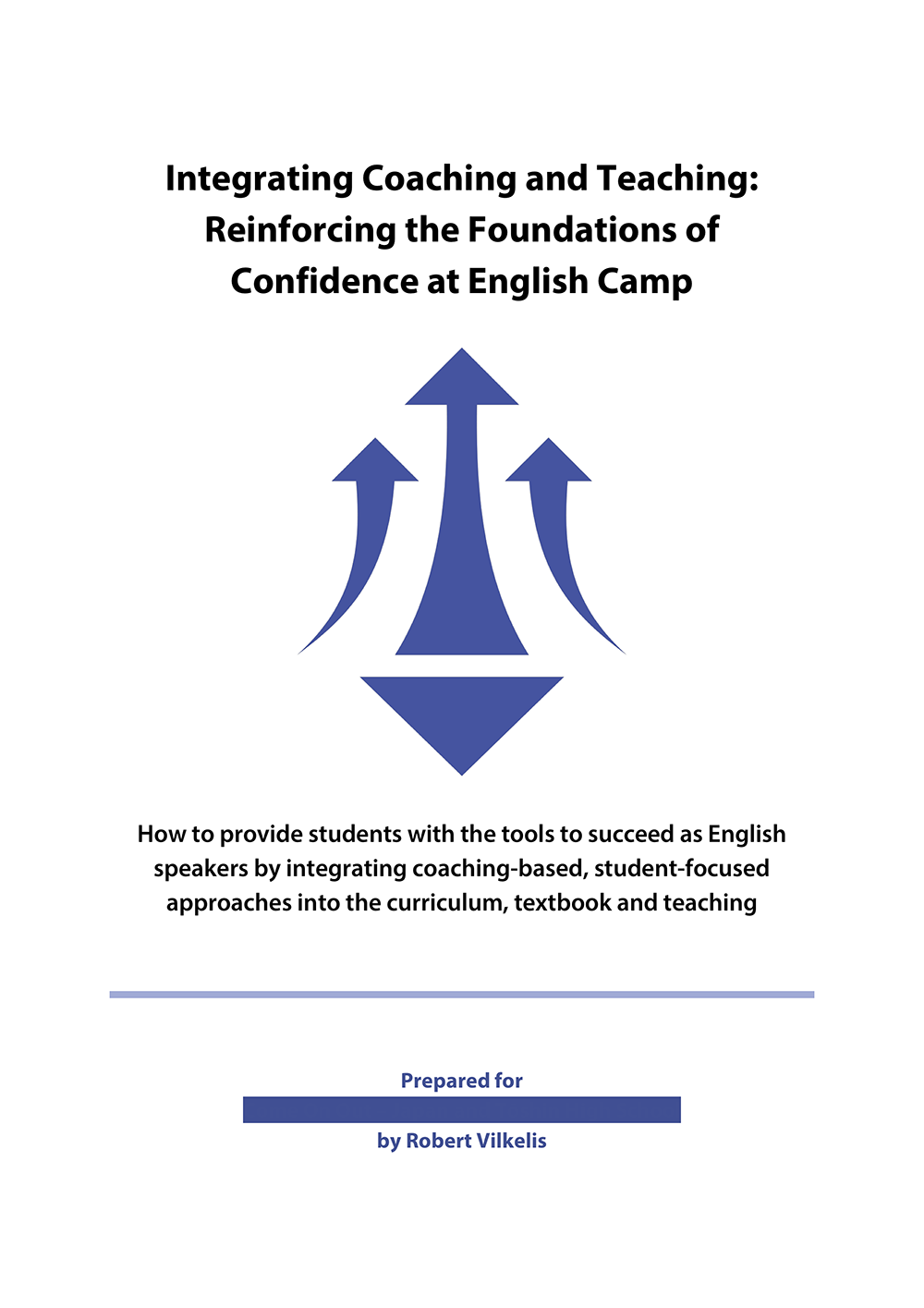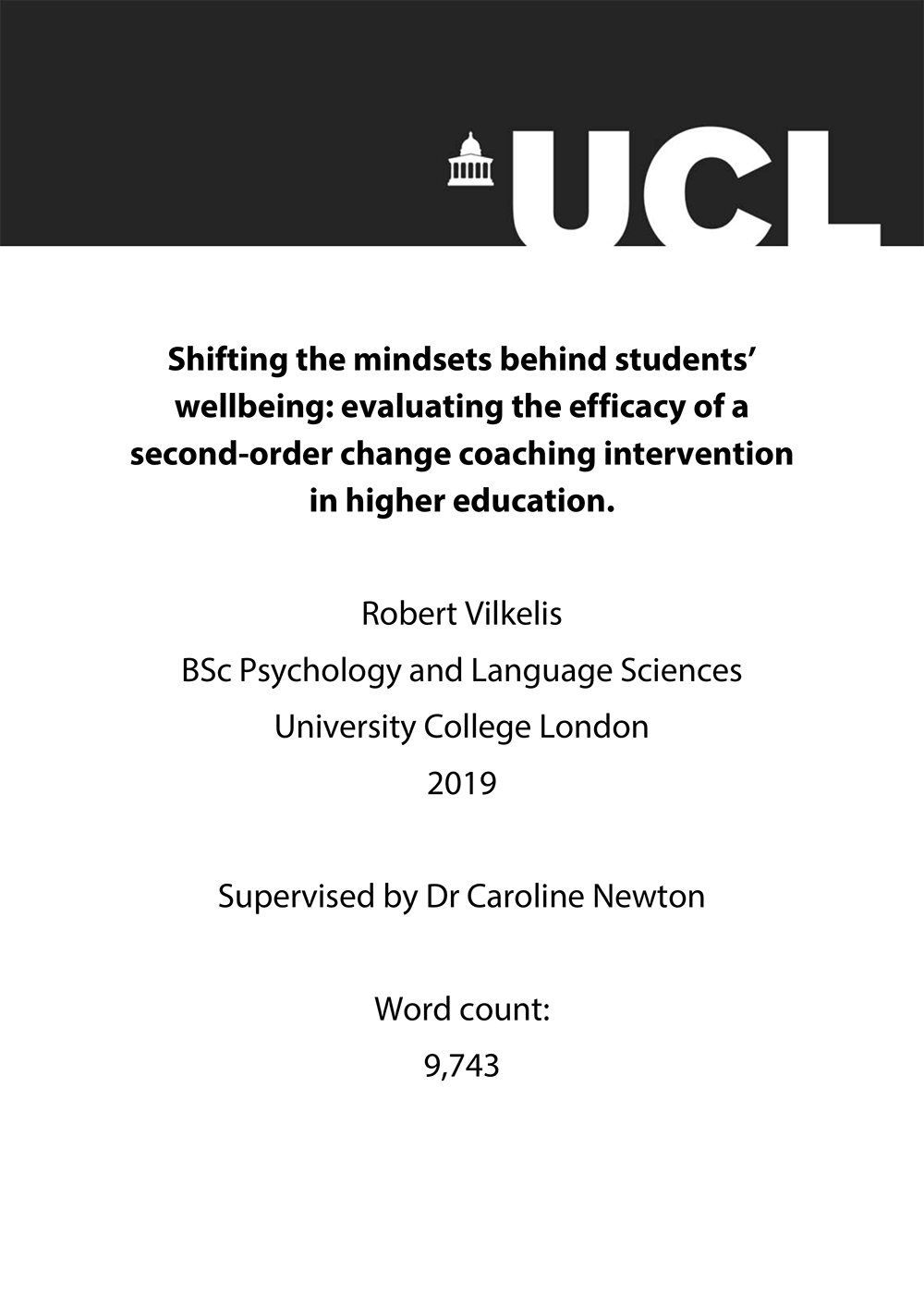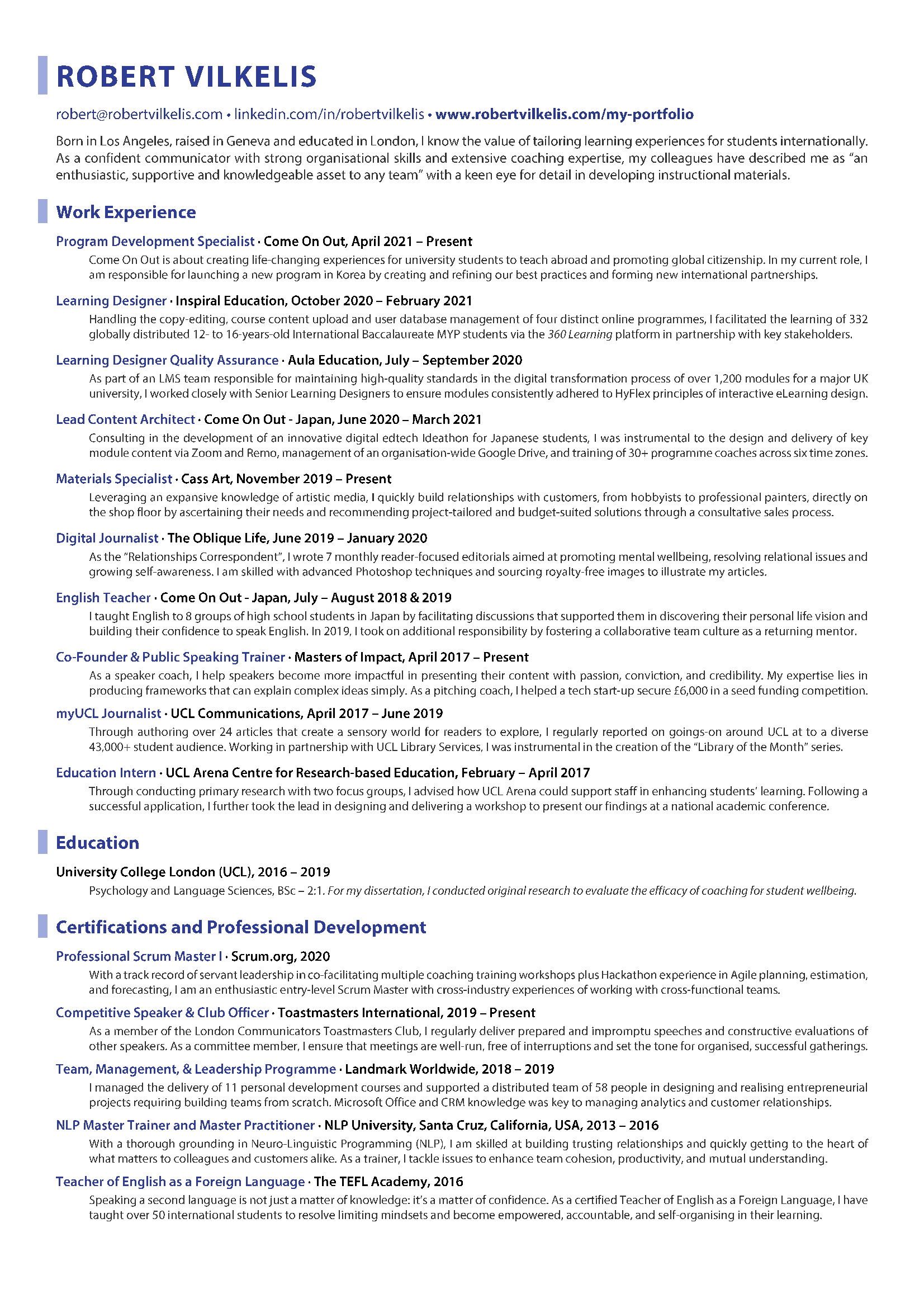
Educational
Consulting
As a certified coach and accredited English teacher, I have extensive experience in training, teaching and facilitating. My previous employers include UCL and one of Japan’s largest cram schools, for whom I authored the 31-page report, “Integrating Coaching and Teaching: Reinforcing the Foundations of Confidence at English Camp.”

Professional
Journalism
As an accomplished writer and interviewer, I collaborate with my clients to author articles that create a sensory world for their readers to explore. As a student journalist for UCL’s official newsletter, I was instrumental in the creation of the “Library of the Month” series in partnership with UCL Library Services.

Academic
Research
For my dissertation, I developed a new coaching process, Commitment Inquiry, which successfully improved the psychological wellbeing of four groups of students. The future of this work is to support constructive dialogue between students and staff and foster mutual accountability. I am currently looking to get my research published in an academic journal.
- We teach English; we build confidence. A coaching-based, student-focused approach focuses on fostering self-discovery rather than downloading information, allowing for students to acquire deeper learnings.
- Reinforcing the foundations of confidence. As teachers, we focus on providing “what” and “how.” Yet, when we identify underpinning beliefs and how to shift them, we expand our ability to improve our students’ confidence.
- The Logical Levels: connecting “what, how and why.” The Logical Levels provides a framework for how we can work with language simply and effectively to support our students inside the classroom and beyond.
- Inventing contexts for learning. By utilising briefing and debriefing strategies, we can both standardise learning within the classroom and ensure that students get the full experience out of their participation.
- Giving Championing Feedback. By giving students feedback that creates awareness of points of positive, points of improvement and who we see them becoming, we can create pride and lasting motivation.
- Including discovery exercises. By asking questions that elicit awareness of “what’s now,” “what’s wanted,” and “how to get there,” students are deeply supported in their learning throughout the programme.
If you are interested in requesting a copy of the report, I would love to hear from you.
- UCL Institute of Education Library (March 2019)
- UCL Student Centre (February 2019), plus my pre-opening teaser special feature
- Royal Free Hospital Medical Library (January 2019)
- UCL Science Library (December 2018)
- UCL Bartlett Library (November 2018)
Further features going as far back as November 2017 are available upon request.
I was also interviewed by UCL Communications in the special feature, “7 Questions with Robert Vilkelis“. Check it out!
- Background: As a significant determiner of the quality of students’ academic experience, supporting students’ psychological wellbeing at university is a chief institutional concern, yet many interventions are met with mixed results. Rather than simply providing additional coping strategies, literature identifies that transforming students’ mindsets is key to lasting change – yet the application of this approach is limited.
- Objective: This study investigated the efficacy of a novel coaching-based intervention, Commitment Inquiry, on improving student psychological wellbeing.
- Methods: Utilising a mixed-methods and repeated measures design, 12 university students reported their psychological wellbeing before, after, and one-week following their participation in the intervention, which consisted of a 90-minute group coaching session. Qualitative data was collected in the form of written feedback.
- Results: Participants’ psychological wellbeing showed sustained, significant improvement between the pre-intervention and follow-up reporting intervals, and results further identified significant differences between wellbeing factors pertaining to personal growth, relationships, control over their surroundings, and self-acceptance. Thematic analysis, additionally, illustrated the importance of interpersonal and academic goals and qualitative factors in promoting change.
- Conclusions: The findings support the intervention’s short-term efficacy and additionally elucidate factors most affecting student wellbeing. A longitudinal replication involving a larger sample, control group and additional measures of wellbeing are advised to ascertain the intervention’s long-term benefits.
If you are interested in requesting a copy of my dissertation, I would love to hear from you.
My CV
- Master Practitioner and Master Trainer of Neuro-Linguistic Programming (NLP).
- Accredited and experienced Teacher of English as a Foreign Language (TEFL).
- Speaker-coach and co-founder of Masters of Impact, a strategic communication company.
- Published author, editor, journalist and copywriter with freelance experience.
- Passion for education, with experience in teaching, curriculum design and consulting in higher education.
My Models
From communication frameworks that highlight key elements for impactful performance to informational structures that distinguish minute aspects of everyday experience, I have developed an array of intellectual property that I use to work with my clients. As a speaker-coach, consultant and trainer, I harness the power of making fine distinctions in language to promote deeper understanding and foster new directions for innovation. Below you’ll find four of my favourite handpicked models – and if there’s one that particularly piques your curiosity, you can read about it in-depth just beyond.

5 Maxims of Effective Communication
How to speak confidently and be remembered for the right reasons.
Becoming a great speaker takes more than just great content and charisma. Nobody said being effective had to be hard, though! From presenting on stage to leading teams to influencing friends, these five key principles will help you take the stress off of you and pay attention to what your audience really cares about. If nothing else, the first two are essential. [Read more]

Content, Process and Relationship
How to take the stress out of practicing public speaking.
Practicing a speech is intimidating. Not only do you have to know your stuff, but you also have to think about your structure, your gestures and your audience. It helps to break it down in a practical way. Have you ever noticed what makes you watch a movie a first, a second, and sometimes even a third time? It’s the same way you should be practicing public speaking. [Read more]

Championing Feedback
How to give superb feedback every time.
Giving feedback is a fundamental skill that few master. It’s not just about evaluating someone’s strengths and weaknesses in task performance, but championing them forward as an individual. Want to learn how to give feedback that isn’t just informative, but also memorable and meaningful? Look no further. [Read more]

Diamond of Dissent
How to understand and re-engage your audience when things go wrong.
There are few things scarier than being at the front of the room and completely losing control. When you think you’ve lost your audience, knowing what to do to get them back on board is key. How can you get your audience back on your side where other speakers fail? Here are the four key behaviours to notice and what to say to address them. [Read more]


